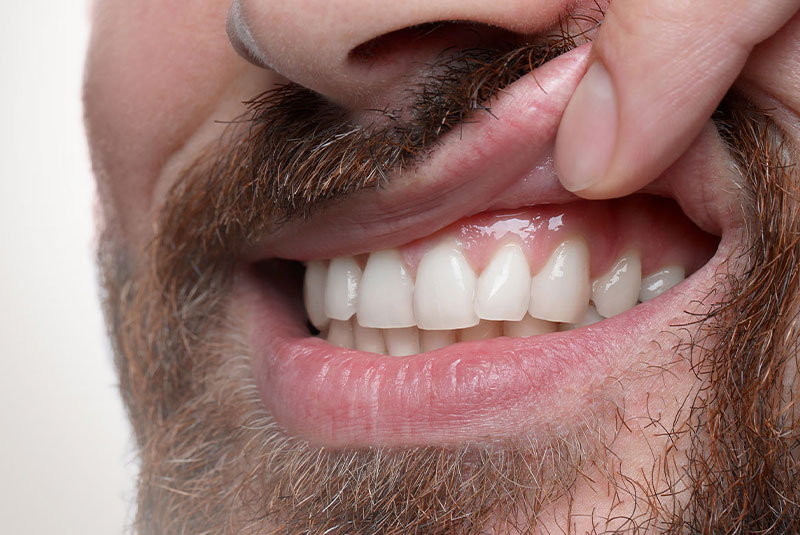Periodontics - Champaign, IL
Stop Gum Disease in its Tracks with Early Gum Disease Treatment
Healthy Gum Tissue is Essential for a Healthy You
Although your gums may not seem like an important part of your mouth, they play a significant role in your smile function and aesthetics. Healthy gums provide a harmonious smile and form a tight seal around the base of your teeth to prevent dangerous bacteria from wreaking havoc on your oral and systemic health. When plaque and tartar accumulate on your teeth and below your gumline, your gums become inflamed and tender before pulling away and forming periodontal pockets.
This can lead to a gum infection, sensitivity, and pain and eventually cause structural problems with your teeth and jawbone. Advanced periodontal disease is the leading cause of tooth loss in adults, but research shows that 73% of children ages 6 to 11 have gingivitis, underscoring the importance of proper oral hygiene. Gingivitis treatment in Champaign, IL, is the first step to prevent gum disease from progressing to advanced gum disease called periodontitis.
Early and Late Signs of Gum Disease
- Swollen, red, or tender gums
- Gums that bleed while brushing or flossing
- Gums that have pulled away from your teeth
- A change in the way teeth fit together when you bite
- Chronic bad breath (halitosis)
- A change in the fit of partial dentures
- Loose teeth, bone deterioration, and tooth loss


Targeted Treatment for Gum Disease
Every time you visit Q Dental for your semiannual exam and cleaning, we perform periodontal screenings to look for signs of gum inflammation before it progresses and impacts your oral health. Our office has the latest diagnostic technology and soft tissue lasers to deliver comfortable, predictable, and efficient gum disease treatment.
We can measure the size of pockets around your teeth using a small probe and determine the most appropriate treatment. We offer a full spectrum of gum disease treatment in Champaign, IL, focused on restoring the health, function, and natural beauty of your visible smile foundation.
Healing Treatments to Restore Your Gum Health
This non-surgical, two-part deep cleaning is often the first procedure to fight gum disease. Scaling at Q Dental removes all the plaque and tartar above and below your gumline, down to the bottom of the periodontal pockets. During root planing, we remove plaque, tartar buildup, and bacteria from the roots of your teeth and smooth rough surfaces.
Soft tissue damaged by gum disease pulls away from your teeth, leaving deep pockets that trap plaque and bacteria. A gingivectomy involves the removal of impacted gum tissue, either with a laser or scalpel. Doing so enables healthy gum tissue to reattach to your teeth after the pockets are cleaned.
Restoring the health of your gums ensures a tight seal that effectively blocks bacteria from inflicting future damage. Although the contour of your gums may change somewhat due to surgery, this leads to a subtle change in your smile aesthetics, making this procedure a good choice for gummy smiles.
When gum recession exposes the roots of teeth, it can increase the risk of decay, tooth sensitivity, and wear. A common grafting method is to remove donor tissue from the roof of the mouth or nearby healthy gum tissue and then attach it to the recessed gum area. A connective gum graft also involves opening a small flap on the roof of the mouth.
However, the graft is removed from under the top layer of tissue. The third method, a pedicle graft, creates a flap of tissue from an area right next to your gum recession and uses this to cover the recessed area. After some time, the soft tissue graft integrates with existing gum tissue.
Crown lengthening can provide functional benefits and improve aesthetics by creating smile harmony. The appearance of short teeth with excessive gum tissue is known as a gummy smile. Although a gummy smile can reduce smile confidence, it can also lead to minor functional problems, such as difficulty speaking clearly or chewing correctly.
These issues are usually associated with a hypermobile upper lip that moves too much when smiling and/or misalignment caused by excessive gum tissue. Functional crown lengthening at Q Dental improves restorative access by exposing adequate tooth structure to place a crown or bridge.
The lingual frenum is the band of tissue that connects the bottom of your tongue to the floor of your mouth. If the frenum is too tight or too short, it can restrict the movement of the tongue. This condition is commonly called tongue-tie (ankyloglossia) and can affect speech, swallowing, breastfeeding, and eating but also inhibit correct jaw development. The latter can cause long-term orthodontic problems and/or sleep apnea.
The labial frenum is the small band of tissue that connects the underside center of your upper lip to the middle of your two front teeth. If the labial frenum is too large, it can create a large gap between the two front teeth and/or cause gum recession as the frenum pulls gum tissue away from teeth. While more common in children, a simple surgical or laser frenectomy can be performed at any age to improve oral health and prevent short- and long-term repercussions.
This traditional surgical procedure treats advanced periodontal disease in Champaign, IL. We gently remove gum tissue from your teeth during surgery to smooth bone irregularities and eliminate or reduce gum pockets. Then, a deep cleaning is performed before we reattach gums to your tooth surfaces. We offer sedation dentistry to make this procedure more comfortable and less stressful.
Peri-implant disease is an inflammatory condition like gum disease that threatens the integrity of dental implants. In its latter stages, called peri-implantitis, the bone can deteriorate and lead to implant failure.
Certain risk factors increase your risk, including a history of periodontitis, diabetes, osteoporosis, tobacco smoking, and a genetic predisposition. Laser surgery to reduce bacteria and treat the damaged bone can help save implants, while reducing pain and discomfort associated with conventional treatment.

